 Vampire Weekend's Surprising Jewish Stories
Vampire Weekend's Surprising Jewish Stories
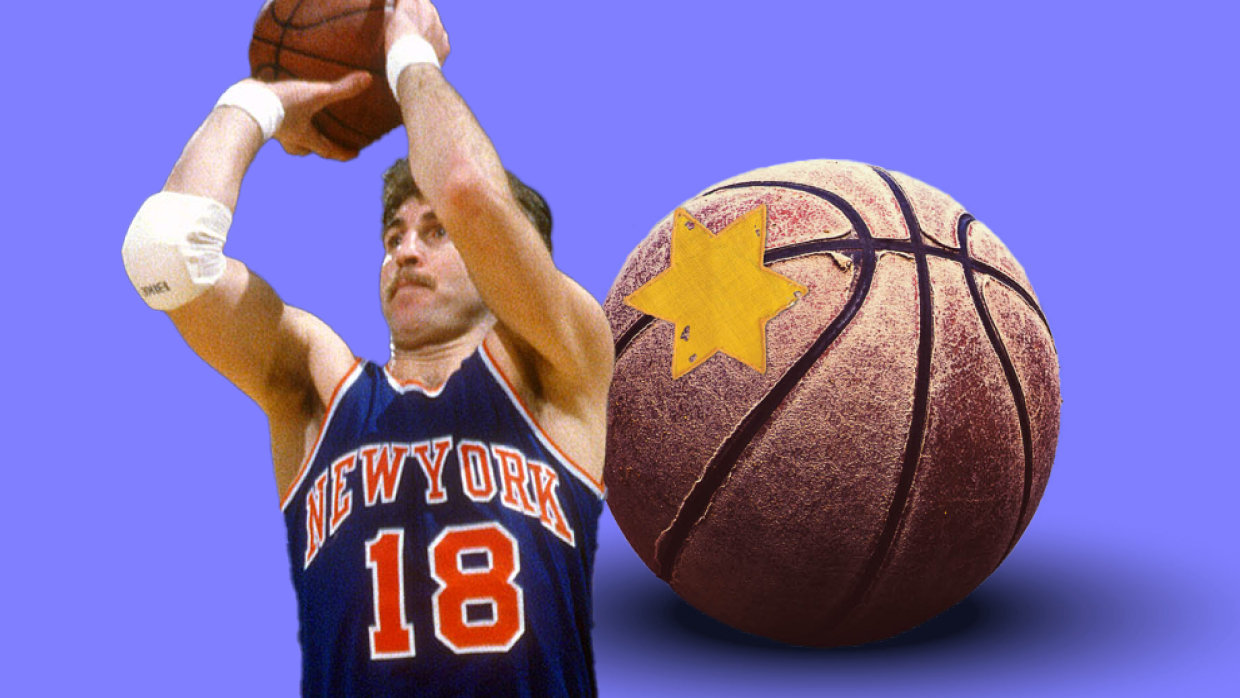

11 min read
Ernie Grunfeld is the only major league professional athlete whose parents survived the Holocaust.
Ernie Grunfeld was an NBA legend who played for the New York Knicks and later became their General Manager and President. In his prime, he was asked to visit basketball camps, high schools, and colleges around the world to motivate the players. He always began his presentations by taking several perfect shots in front of hundreds of students.
Ernie made it look easy. He was a 6’6” giant, boasting a size 16 shoe. He easily sank each basket.
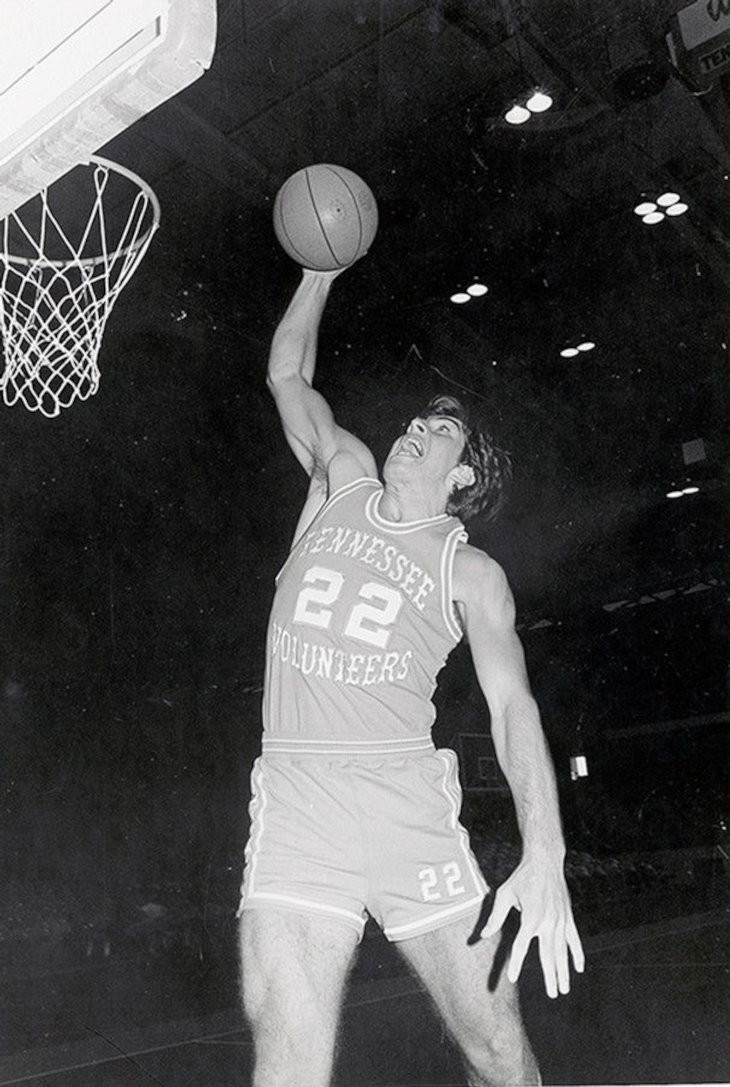 Ernie Grunfeld taking the shot
Ernie Grunfeld taking the shot
Then he turned to the crowd of students and said, “I bet you think I made these shots because I’m tall and big. But I’m going to prove that you don’t have to be tall or strong to make a perfect shot. Anyone who shoots with perfect form can make a perfect shot—no matter how small.”
He would then search for the smallest, tiniest player in the crowd and call him up. Little did the audience know but Dan Grunfeld, Ernie’s son, was planted among the crowd. He was only five years old and so scrawny that he looked like every bully’s dream target.
As Dan slowly walked up to the court, the snickering and whispering was audible. Some kids would laugh.
With ball in hand, little Dan squared up to the basket and took the shot. The ball left his grip in perfect form and—swish. The crowd was silenced.
Ernie’s lesson was simple: In life, you can do great things at any age or size. The fact that Ernie won a gold medal in the Olympics for basketball at the age of 21 helped drive this point home.
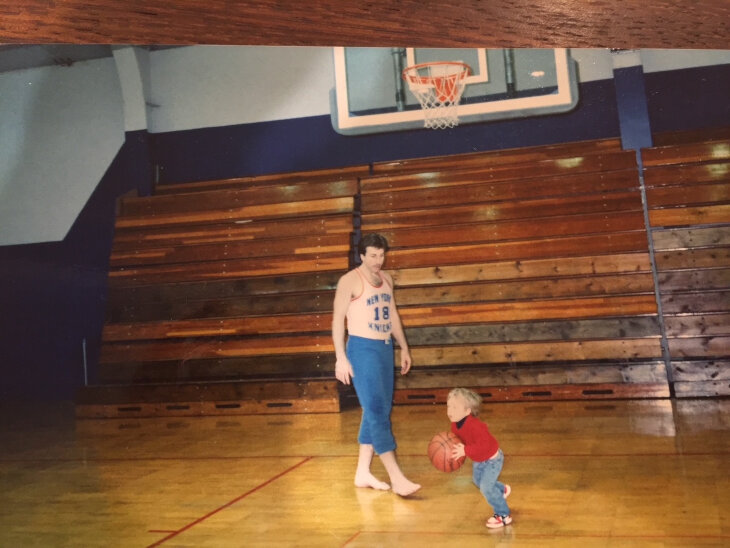 Father and son on the court
Father and son on the court
But the more poignant lesson came from Ernie Grunfeld’s mother, a teen who survived the Holocaust.
Dan wrote a riveting book about his father and grandmother’s life entitled, By the Grace of the Game. Dan noted, “My grandmother, Lily Grunfeld, whom I call Anyu, is the real hero of the story. During the Holocaust, she was only 17 when she risked her life to save the lives of 17 other random Jews.”
You don’t have to be big to do great things.
When the Nazis encroached on Anyu’s hometown, she was visiting her sister in Budapest. They received a letter from her parents, which said, “Come home as fast as you can.” She and her sister quickly packed their belongings and headed to the local train station the next day.
As they were leaving the house, a second letter arrived stating, “Do not come home.”
The Nazis had swiftly invaded. That letter, which arrived just in the nick of time, saved her from the fate of Auschwitz.
While in Budapest, she learned that Raoul Wallenberg was issuing protective passports called the Schutz Pass.
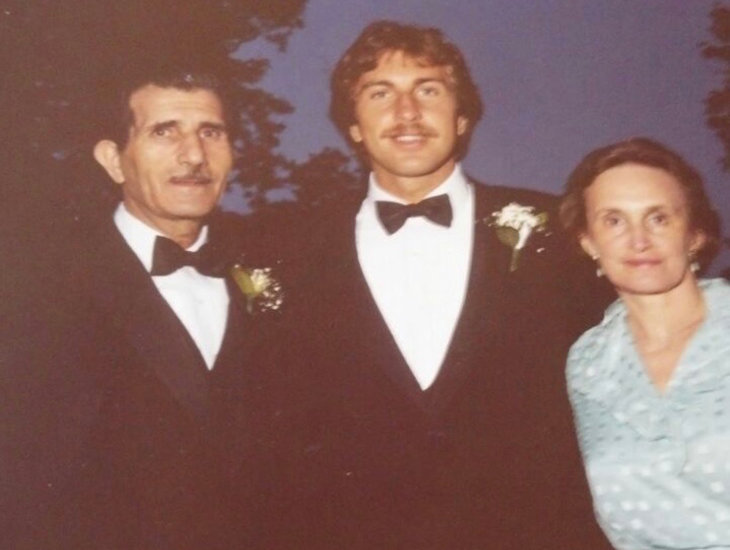 Ernie and his parents
Ernie and his parents
Because Anyu was blonde and could pass as Aryan, she was able to go to the Swedish embassy and wait in line. This was risky because Nazis were pulling Jews out of that line and deporting them. After hours of waiting, she approached the clerk who asked for her papers. Crestfallen, Anyu realized she hadn’t brought the papers.
Inexplicably, the clerk replied, “Here is a note which will enable you to cut the line and come right to the front.”
She went back, got her papers, and cut the line to receive her Schutz Pass. They also didn’t confiscate her note. Thanks to that oversight, Anyu made the grueling trek 17 more times to secure additional passes for others in need. She then gave these passes to other Jews, sometimes strangers, to help them survive. Although food was scarce and she could have bartered, she asked for nothing in return.
The Schutz Pass kept her alive. But this was not the only time Raoul Wallenberg would save her life.
Eventually, someone informed the Nazis that Anyu was in fact a Jew, and she was captured and placed in the Budapest ghetto. Once there, she was reunited with her brother.
It was 1945, and Germany was losing control in Budapest. One day, Anyu saw Nazis gathering outside the ghetto. They were getting into formation, with machine guns on their backs. Word quickly got out that they were there to liquidate the ghetto.
Andy, Anyu’s brother, grabbed her hand and they found a small attic space to hide in. They heard pounding footsteps coming after them, but it wasn’t the Nazis—it was more Jews looking to cram inside the hiding space. It was tightly packed with 12 people in a four-person space. There wasn’t an inch left to hide anyone else.
Everyone held their breath. The silence was heavy and no one dared to move. Even breathing was dangerous. A few minutes of silence passed. Each breath felt like an eternity. An hour later, there was still no noise.
Where were the gunshots? Was this some sort of trick? they all wondered.
“What should we do?” they whispered. After a few more minutes, they sent someone out to check. Sure enough, the Nazis were gone.
They were free, but Anyu never knew why the Nazis left without invading that day.
Forty years later, she found out.
One evening, she was watching a movie that portrayed this very scene in the Budapest Ghetto.
Dan explained, “The Nazis stormed into the Budapest ghetto with machine guns, with orders from Eichmann to murder all the remaining Jews. The frame jumps to a frantic Wallenberg driving a car, furiously trying to reach the ghetto. He barely puts his car in park as he jumps out and locates General Gerhard Schmidhuber, Commander of the German troops in Hungary. Wallenberg pleads with the General. He lets him know that the war is over, and that he will be hung for what he’s about to do. That convinces the General to call off the massacre. The Nazis walked out the gate and never returned.”
Anyu married, had two children, and came to America after narrowly escaping another harrowing fate during Romania’s Communist regime.
A few months after arriving in America, the unthinkable took place.
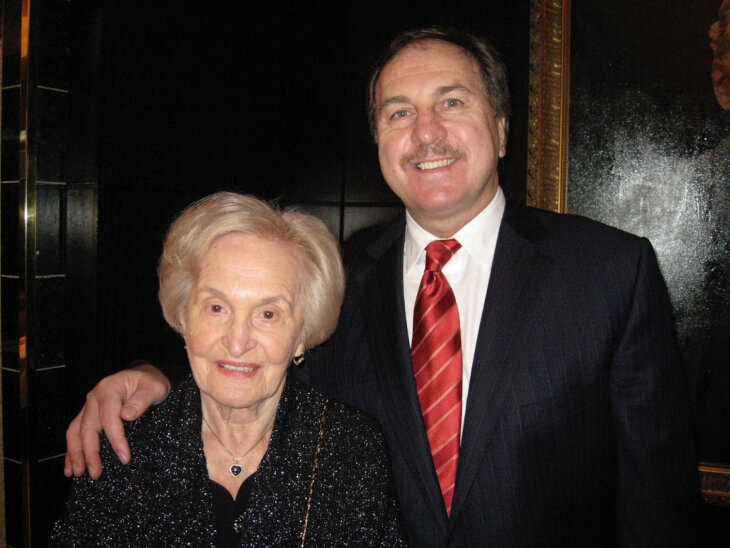 Ernie with his mother, Anyu
Ernie with his mother, Anyu
The legs of her son, Leslie, started to bruise inexplicably. “Suddenly, balls of blue and purple spotted his thighs, calves, and shins. It couldn’t have been the contact during his soccer games.” They went to the doctor and the worst was confirmed. He had leukemia, and it was terminal.
A few weeks before dying, he whispered to his mother, “My brother, Ernie. There’s nothing I would love more than for him to become a famous person in America.”
Ernie went on to become a legendary basketball star. At the time of his brother's words, he was only ten years old and had never touched a basketball.
Dan explained, “The kids in New York were making fun of him. He barely spoke English, and his parents were never around because they were working around the clock.”
Ernie started going to the local playground to try to make friends and distract himself from his brother’s death. He began to shoot around, and basketball just clicked for him. Soon he was the best in the park, then the best in the city, followed by the best in the country.
“He was a phenom!” Dan exclaimed. “His stats were unmatched.”
Ernie was the most prominent Jewish athlete of that time. But he was always humble. He never spoke about himself, and because of this, his parents didn’t actually see him play basketball until he was a junior in high school.
“They didn’t know what was happening because they were working so hard, and they assumed basketball was just a pastime that kept Ernie out of trouble.”
In order to watch Ernie play in high school, they would have had to close their store, which wasn’t an option.
One evening, they got a call from the head coach of the team. “I think you should come see Ernie play.”
They closed the shop but not early enough to arrive at the start of the game. By the time they arrived, the gymnasium was packed and locked, and there was no space for anyone to enter. They knocked on the door, hoping to persuade someone to open up.
“Sorry! The gym is packed, no one else can enter. Try again on another night,” said a security guard.
“But we want to see our son, Ernie Grunfeld, play!” Anyu insisted.
With shock, the stranger said, “Ernie Grunfeld is your son? Well, why didn’t you say so in the first place? Come on in!”
When they entered the gym, they scanned the court but couldn’t see him.
Well, if he’s so great, why isn’t he on the court? his father thought.
“Look, right there!” Anyu said. “He is on the court.”
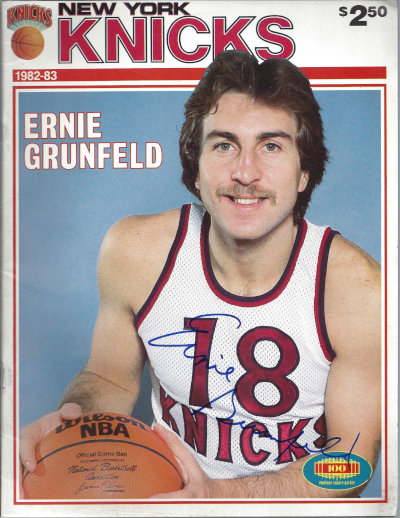
At that moment, they realized the incredible evolution that had taken place. They were used to seeing their son in sweats around the house. Out there in his basketball uniform, he looked like a man, not a child.
Until that point, they had Ernie working every weekend at their fabric store. After that game, they told Ernie, “You focus on your game and we will do the rest.”
Ernie was invited to try out for the United States’ Olympic team but he wasn’t yet a citizen. He got his citizenship in 24 hours because he was favored to represent the U.S. When he made the team, his parents closed their fabric store for two weeks to attend the games.
That year, Ernie’s team won it all, making him an Olympic gold medalist at the age of 21.
His parents coped with the ashes of the Holocaust by choosing to move away from the land they knew and push forward after his brother’s death. Basketball was a salvation for their family. For Ernie, as an immigrant, he never felt he belonged in his life, but he belonged on the court.
Dan followed in his father’s footsteps. “I played at Stanford. My first contract offer as a pro was, ironically, in Germany.
“When they offered me the job I said, ‘Let me get back to you, I need to check with my grandmother.’ That was probably the first time they had ever heard that response.
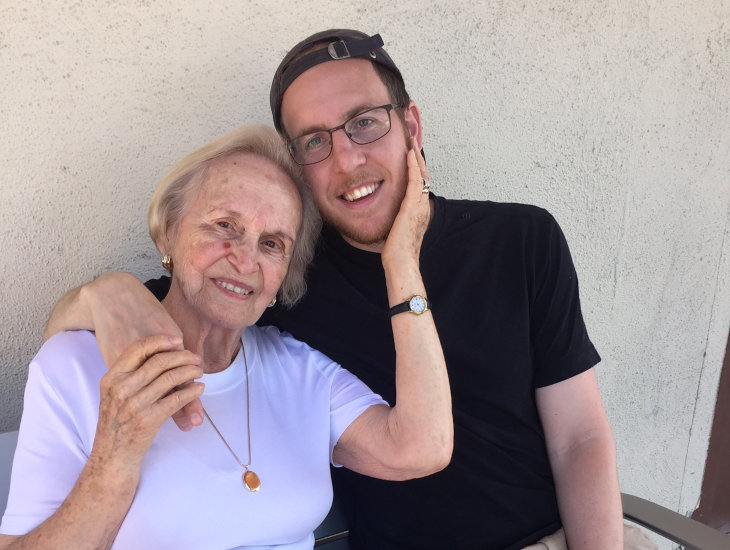 Dan Grunfeld and his grandmother
Dan Grunfeld and his grandmother
“When I asked my grandmother, she responded, ‘I don’t see a problem. Sons are not responsible for the sins of their fathers.’”
While she will never forgive the people who perpetrated such evil, she believed the new generation wasn’t responsible for their forefathers’ actions. With this generation, she was able to move forward and forgive.
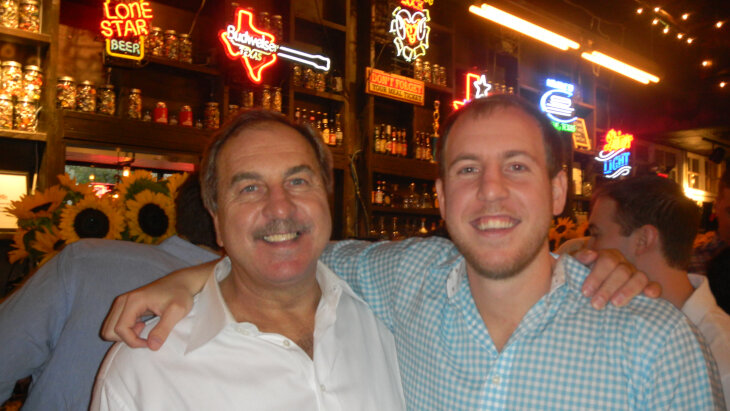 Dan and his father
Dan and his father
Dan struggled with being the child of a sports star. “People assumed that my father’s success was the reason I’d had any success. Once, when I earned MVP of a tournament, I heard the parents complain, ‘Aw, c’mon! He’s the son of the GM of the Knicks! This is ridiculous!’”
Dan used this negative energy to fuel his fire and continue to work hard. This was something he learned from his family’s actions.
“I saw what my family overcame. My dad and grandmother both always harped on the power of hard work. They claimed that while many factors of success are not in your control, effort is always in your control. My dad outworked everyone. He always said, ‘Rely on what you can control, which is the work you put in.’”
The second lesson Dan gleaned from his father and grandmother is to always have hope and never give up.
“There is a lot of darkness in our story, but there is much more light. Always have hope and stay close to people who support you. Grab onto them and allow them to move you forward. Our story is about maintaining hope, staying positive, and working hard. If any story can help you believe, this one is it.”
Dan admits that his life was far from average. “I have privilege, for sure. But the greatest privilege I ever had is the luxury of dreaming big. Because I saw the impossible transpire, I had belief that big things were possible. I want to give my readers the same vision that you can rise from nothing.”
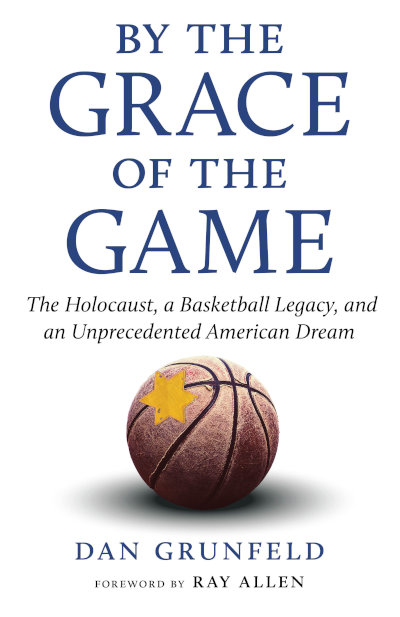
Successful in his own right, Dan was an Academic All-American at Stanford, and he played professional European basketball. (He also outscored Lebron James once in a tournament!)
“I am proud of my accomplishments, but it came from the fact that I believed I could do it. I wanted to play for Stanford because my grandmother lived half an hour away. It was a combination of luck, skill, and timing.”
Dan’s strongest message is that all things are possible, no matter the odds stacked against you. “Just because things are improbable, doesn’t mean they are impossible. You never know what can happen, and it’s our responsibility to keep going. My grandmother is the one who exemplifies this best. By the grace of the game, keep going.”
Check out Sarah's interview with Dan on the Aish podcast: Star Struck with Sarah Pachter.
